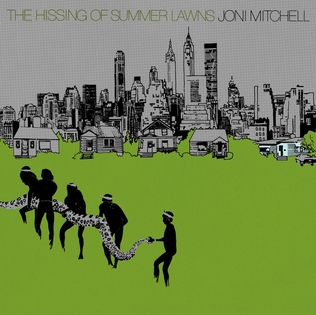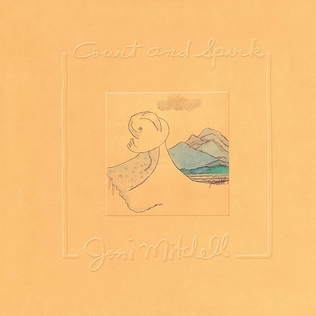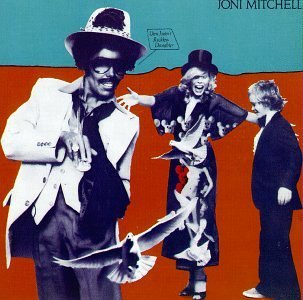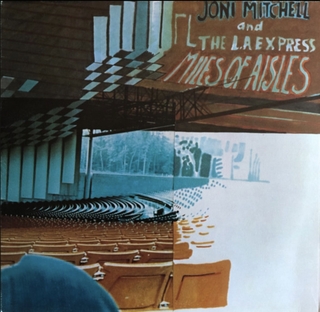
Roberta Joan "Joni" Mitchell is a Canadian-American singer-songwriter, multi-instrumentalist, and painter. She is widely considered one of the greatest singer-songwriters of all time. As one of the most influential singer-songwriters to emerge from the 1960s folk music circuit, Mitchell became known for her personal lyrics and unconventional compositions which grew to incorporate pop and jazz elements. She has received many accolades, including eleven Grammy Awards and induction into the Rock and Roll Hall of Fame in 1997. Rolling Stone called her "one of the greatest songwriters ever", and AllMusic has stated, "Joni Mitchell may stand as the most important and influential female recording artist of the late 20th century."

Ladies of the Canyon is the third studio album by Canadian singer-songwriter Joni Mitchell, released on Reprise Records in 1970. It peaked at No. 27 on the Billboard 200, and has been certified platinum by the RIAA. The title makes reference to Laurel Canyon, a center of popular music culture in Los Angeles during the 1960s, where Mitchell lived while she was writing the album. Specifically, Mitchell lived and wrote at 8217 Lookout Mountain Avenue, the house which is the subject of Graham Nash's "Our House". The album includes several of Mitchell's most noted songs, such as "Big Yellow Taxi", "Woodstock" and "The Circle Game".

The Hissing of Summer Lawns is the seventh studio album by the Canadian-American singer-songwriter Joni Mitchell, released in November 1975 on Asylum Records. It continues the jazz-influenced sound of Mitchell's previous album, Court and Spark, with more unconventional and experimental material. It features sampling, synthesizers such as the Moog and ARP, and contributions from acts including the jazz-rock groups the L.A. Express and the Jazz Crusaders and James Taylor, David Crosby, and Graham Nash.

Matters of the Heart is the third studio album by American singer-songwriter Tracy Chapman, released on April 28, 1992, by Elektra Records. It was her first not to be produced or co-produced by David Kershenbaum.

Court and Spark is the sixth studio album by Canadian singer-songwriter Joni Mitchell. Released in January 1974, it infuses the folk rock style of her previous albums with jazz elements.
"A Case of You" is a song by Joni Mitchell, from her 1971 album Blue.

"Carey" is a song from the 1971 Joni Mitchell album Blue. It was inspired by her time spent with Cary Raditz, living with a cave-dwelling hippie community at Matala, on the Greek island of Crete.

"Free Man in Paris" is a song written by Canadian singer-songwriter Joni Mitchell. It appeared on her 1974 album Court and Spark, as well as her 1980 live album Shadows and Light. It is ranked No. 470 on Rolling Stone's list of the 500 Greatest Songs of All Time.

Both Sides Now is a concept album and studio album by Canadian singer-songwriter Joni Mitchell that was released in 2000. It is her 17th studio album. The album won two Grammy Awards in 2001 for Best Traditional Pop Vocal Album and Best Instrumental Arrangement Accompanying Vocalist(s) for the song "Both Sides Now" and a Juno Award for Vocal Jazz Album of the Year.

Hejira is the eighth studio album by Canadian singer-songwriter Joni Mitchell, released in 1976 on Asylum Records. Its material was written during a period of frequent travel in late 1975 and early 1976, and reflects Mitchell's experiences on the road during that time. It is characterized by lyrically dense, sprawling songs and musical backing by several jazz-oriented instrumentalists, most prominently fretless bass player Jaco Pastorius, guitarist Larry Carlton, and drummer John Guerin.

Don Juan's Reckless Daughter is a 1977 double album by Canadian singer-songwriter Joni Mitchell. Her ninth album, it is unusual for its experimental style, expanding even further on the jazz-influenced sound of Mitchell's previous recordings. Mitchell has stated that, close to completing her contract with Asylum Records, she allowed this album to be looser than anything she had done previously.

For the Roses is the fifth studio album by Canadian singer-songwriter Joni Mitchell. It was released in November 1972, between her two biggest commercial and critical successes—Blue and Court and Spark. In 2007 it was one of 25 recordings chosen that year by the Library of Congress to be added to the National Recording Registry.

Miles of Aisles is the first live album by Canadian singer-songwriter Joni Mitchell, released in 1974 on Asylum Records. It is a double album documenting her concerts in support of the Court and Spark album with her backing band for the tour, the L.A. Express. It reached No. 2 on the Billboard 200 and became one of her biggest-selling records, certified a gold record by the RIAA.

Wild Things Run Fast is the 11th studio album by Canadian singer-songwriter Joni Mitchell. Her first of four releases for Geffen Records, it was released in 1982 and represents her move to a more 1980s pop sound. This was her first album to work with bassist Larry Klein, whom she married in 1982. Klein would play bass on and co-produce her next four albums.

Dog Eat Dog is the 12th studio album by the Canadian singer-songwriter Joni Mitchell, released in 1985. It was her second album for Geffen Records.

"Help Me" is a love song written, produced, and performed by Joni Mitchell and released on her 1974 album Court and Spark. The song was recorded with jazz band Tom Scott's L.A. Express as the backing band.

Shine is the 19th and final studio album by Canadian singer-songwriter Joni Mitchell, released on September 25, 2007, by Hear Music. It is Mitchell's first album of new material since Taming the Tiger (1998).

Since her debut album in 1968, Canadian musician Joni Mitchell has released 19 studio albums, most recently 2007's Shine. Her most commercially successful period was the early-mid 1970s, which included 1970's Ladies of the Canyon, 1971's Blue and 1974's Court and Spark, all three of which reached Platinum status in the US.
"In France They Kiss on Main Street" is a song by Canadian singer-songwriter Joni Mitchell from the album The Hissing of Summer Lawns. It was released as a single in 1976 and reached number 66 on the Billboard Hot 100. Despite the title referring to kissing in France, the song actually tells a story of young romance and coming of age in the 1950s in North America.

The Reprise Albums (1968–1971) is a four-disc box set by Canadian singer-songwriter Joni Mitchell, that was released on June 25, 2021, by Rhino Records. The set is the sixth overall release and first box set of remastered albums from the Joni Mitchell Archives, a planned series of releases featuring remastered and unreleased material from the singer's archives. Formatted in chronological order, the first volume of the remaster series includes Mitchell's first four albums, all of which were released on Reprise Records: Song to a Seagull (1968), Clouds (1969), Ladies of the Canyon (1970), and Blue (1971).


















